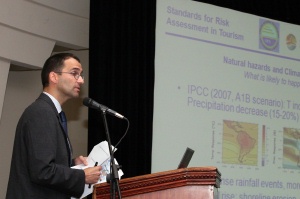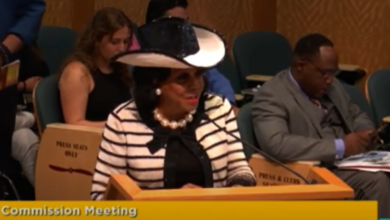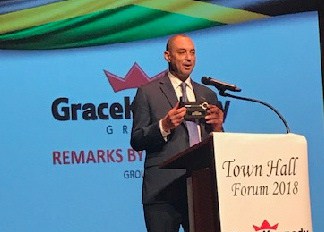Bahamian Tourism Stakeholders Devise Disaster Management Standards
NASSAU, Bahamas – The importance of protecting the country’s tourism industry in the face of catastrophic events was underscored at a national workshop on disaster management on Tuesday, May 13.
“We are actually aware that tourism is our number one industry and is certainly worth protecting,” said Senior Director at the Ministry of Tourism and Aviation Geneva Cooper in an address to the Development of Standards for Conducting Hazard Mapping, Vulnerability Assessment and Economic Valuation for Risk Assessment for the Tourism Sector workshop held at the Wyndham Nassau Resort on Cable Beach.
“The importance of tourism cannot be overstated. Firstly, the economic value – it is vital for generating income, creating and sustaining jobs, encouraging foreign investments, providing trade opportunities and earning foreign exchange for Bahamians.
“Secondly, we all now realize that true protection of our tourism industry is only possible through real partnerships, which include regional, private/public collaboration, inter-governmental and internal cooperation within each of our own organizations,” Mrs Cooper said.
Workshop participants included representatives from hotels, travel agencies, food and service organizations, emergency services and local government districts.
“While CDERA is seeking input for a regional framework, our hope is that at the end of this process each of us would have contributed to the development plan, complimentary to our existing national plan,” Mrs Cooper said.
“It is critical that we have such comprehensive plans in place, and persons with the appropriate expertise and authority to be able to immediately respond should a crisis arise,” she added.
Mrs. Cooper encouraged more stakeholders to become involved in workshops and training programs, and give practical support in risk management towards the continuing efforts to protecting the industry.
The workshop was conducted by consultants from Disaster Risk Management, Switzerland, who presented the methodology for standard, for sustaining the tourism product. In a consensus-building workshop, participants were asked to identify and make recommendations towards this goal.

Dr. Manfred Thuring, consultant, Disaster Risk Management of Switzerland facilitating a workshop on the Development of Standards for Conducting Hazard Mapping, Vulnerability Assessment and Economic Valuation for Risk Assessment for the Tourism Sector, at the Wyndham Nassau Resort
(BIS Photo/Kristaan H. A. Ingraham II)
The workshop was held by the Caribbean Disaster Emergency Response Agency (CDERA), with the support of the Inter-American Development Bank, and in collaboration with the Caribbean Tourism Organisation, CARICOM Regional Organisation for Standards and Quality, and the University of the West Indies.
The partners will implement the Regional Disaster Risk Management for Sustainable Tourism in the Caribbean Project over the period January 2007, to June 2010.
Under the project, a Regional Disaster Risk Management Framework, a Regional Disaster Risk Management Strategy and Plan of Action for the Tourism Sector will be developed through the collective action of regional as well as national stakeholders in the tourism and disaster sectors.
“A fundamental component of the strategy will be the development of standardised methodologies for conducting hazard mapping, vulnerability assessment and economic valuation for risk assessment for the tourism sector,” said CDERA.
A consultancy firm was engaged by CDERA to prepare draft standards for the conducting of and cartographic presentation of hazard mapping, vulnerability assessments and economic valuation for risk assessment for the tourism sector in the Caribbean.
To facilitate consensus building for the standards development process, in collaboration with national focal points, CDERA convened one-day workshops in each of the five project pilot states — The Bahamas, Dominican Republic, Jamaica, the Turks and Caicos Islands and Barbados.
The workshop was the second in a series being held in The Bahamas. The first was held on Friday, April 25. The project is being funded by the Inter-American Development Bank.


